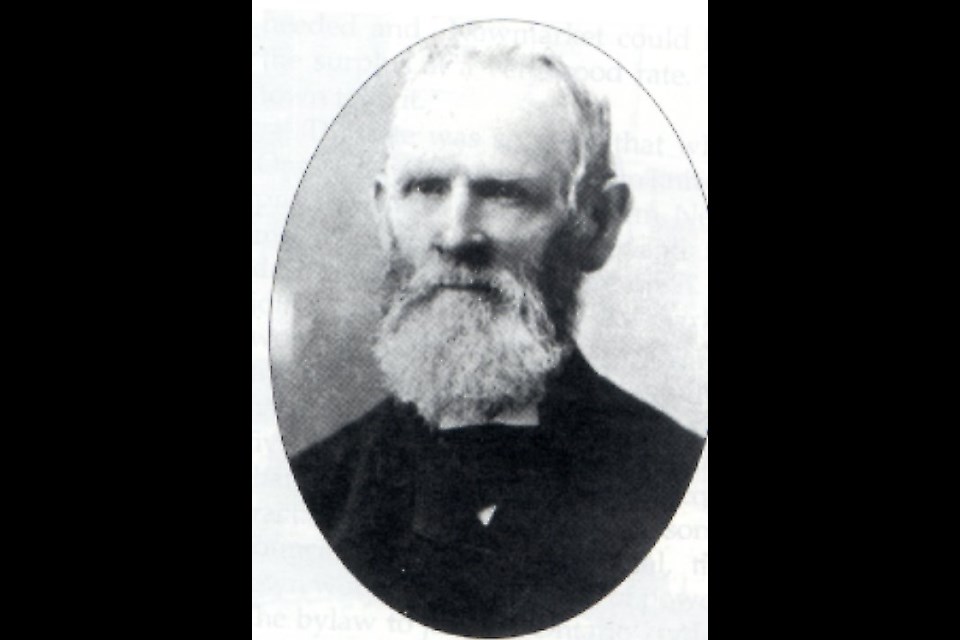NewmarketToday.ca brings you this weekly feature about our town's history in partnership with Richard MacLeod, the History Hound, a local historian for more than 40 years. He conducts heritage lectures and walking tours of local interest, as well as leads local oral history interviews. You can contact the History Hound at [email protected].
Newmarket has had its share of family dynasties over the years, the Cane, Davis, Widdifield, Playter and Denne families being but a few.
Over the next few months, I shall examine many of these historic families with an eye to their civic and political contributions to Newmarket. The first family I shall attempt to do justice to is the Cane dynasty – William Cane, the father, Henry S. Cane, the son, and Howard Cane, grandson of William. All were mayors and immensely successful business entrepreneurs. We will begin with William Cane, the patriarch and our very first mayor.
William was prominent in local politics and extremely successful in business, but perhaps a little bedevilled by the curse of 19th-century Newmarket: fire and flood.
Left an orphan early in life, he was the offspring of Irish parents from New York who came to the Queensville area in 1834 when William was an infant. His first brush with fire destroyed everything that his father had left him and he was forced to start from scratch.
He lived in Lindsay and Mariposa (Orillia) for a time, but at the age of 18, he returned to Queensville and set himself up in his trade of woodworking, opening a shop with the purpose of manufacturing pumps and wagons. Soon he purchased a saw mill.
Once established in business, he married Catherine Belfry of Queensville. Known as a gruff, unsmiling gentleman, he produced two sons and a grandson who would go on to serve in the political life of the town.
In 1864, he built a sawmill, boarding house and several other buildings on the 5th Concession just south of Queensville known as Cane’s Mills. Unfortunately, the whole complex was destroyed by fire soon after. Again, he rebuilt and that, too, was destroyed by fire. You can see why I indicated he was cursed by fire and disaster.
Active in politics early in his life, William served as a councillor and as reeve of East Gwillimbury and, in 1874, he became warden of the County of York. He decided to rebuild his business for a third time, this time in Newmarket. He purchased what was then the Sykes foundry and engine works on Huron Street (present-day Davis Drive) but three months later, it burned to the ground. He built a tannery but sold it a few years later, and it immediately burned down.
In 1885, he rebuilt a woodenware factory, Wm. Cane and Sons, but it was soon destroyed, too.
William, by this time, had 11 children. Once again, he re-built, this time a three-building complex constructed of brick with a huge firewall incorporated. It was to employ more than 250 local workers.
William was our first mayor and he and his son, Henry, ordered the construction of a water works system for Newmarket and a new fire department was formed. Good thing, as in 1887, his factory again caught fire, but the new fire brigade and water system allowed most of his factory to escape damage.
Eventually, this building became the Dixon Pencil Company, though, when I was little, you could still see the Cane sign on the old smokestack.
William’s political career was far reaching. He joined the Village and then the Town council almost from the time he came to Newmarket. He was elected mayor in 1881, the first mayor of this village that had grown into a town. He served for eight years, when the terms were two years in length, before resigning his position. He continued to maintain his interest in politics, serving as president of the North York Reform Association, but he never took his aspirations to the provincial level.
William died in May 1899 and it is said all the flags were lowered throughout town as the entire town mourned his passing.
Next week, we will look at his son, Henry S. Cane, who instrumental in the establishment of our water system, phone and hydro services.
Sources: Newmarket Centennial 1857-1957 – Mr. Jack Luck; Newmarket Era, Cane Dynasty, June 4, 1980; History of the Town of Newmarket – Ethel TrewhellaHistory of the Cane Family, clippings from the Newmarket Archives; George Luesby archives collection.
